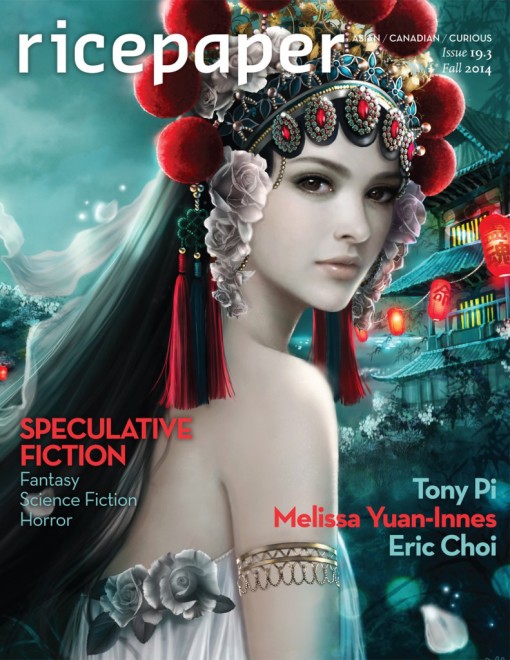My new short story “Túshūguăn”, set in a post-apocalyptic Vancouver, appears in Ricepaper magazine’s special Speculative Fiction edition (Issue 19.3, Fall 2014) which was guest co-edited by Derwin Mak and JF Garrard. This special issue also features stories by John Matsui, Tony Pi, JF Garrard and Melissa Yuan-Innes, with cover art by K‑Koji. Each issue of Ricepaper also has a department called “Author Spotlight”, which asks some random questions to the issue’s contributing authors. Here are my answers:
Each issue of Ricepaper also has a department called “Author Spotlight”, which asks some random questions to the issue’s contributing authors. Here are my answers:
My favourite horror movie is Shaun of the Dead, because humor always goes well with horror. As a writer, I greatly admire the cohesiveness, depth and intelligence of Edgar Wright and Simon Pegg’s script. There is not a single scene that is wasted nor a single line of dialogue that does not have meaning in that film.
I first became interested in science fiction, fantasy, or horror when I saw the Star Trek original series episode “Devil in the Dark” when I was about eight years old. It scared the hell out of me, but something made me keep turning back to the TV to watch more. I try to avoid wearing red shirts.
My pet peeve in science fiction, fantasy, or horror is when they are all lumped together, for example, on bookstore shelves. Come on people, they are completely different genres!
My favorite spaceship captain is former NASA astronaut John Young. He piloted the first Gemini mission in 1965 (on which he smuggled aboard a corned beef sandwich), commanded Gemini 10 in 1966 and orbited the Moon on Apollo 10 in 1969 before going on to command three more historic space missions: Apollo 16 in 1972, the first Space Shuttle flight in 1981, and the first Spacelab mission in 1983. Young had the longest career of any NASA astronaut (over 40 years) and is the only astronaut to have piloted or commanded four different types of spacecraft.
The book I’m reading now is The Chinese in America by Iris Chang. Thread of the Silkworm, her definitive biography of Chinese rocket scientist Tsien Hsue-Shen, was a crucial source of research for my alternate history story “The Son of Heaven” in the anthology The Dragon and the Stars. Chang’s tragic death by suicide only a year after the publication of The Chinese in America, at the age of 36, robbed us of an important and eloquent voice.
If I had to chose another place to live, it would be not a place, but a time. Some years before his death, the English engineer and mathematician Charles Babbage reportedly told a friend that he would gladly give up whatever time he had left, if only he could be allowed to live for three days, five centuries in the future.